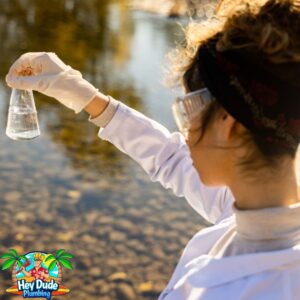Understanding Filtration and Purification: The Significance of Water Quality Matters
Water is undeniably one of our most precious resources. It sustains life, nourishes our bodies, and plays an integral role in our daily routines. Yet, the purity of the water we consume cannot be taken for granted. The quality of our water supply varies widely, and the presence of contaminants poses potential risks to our health and well-being.
In this era of increasing environmental concerns, understanding water filtration and purification has never been more critical. Access to clean and safe drinking water is a fundamental human right, and it’s a responsibility we must all take seriously.
Our blog, “Water Quality Matters: Understanding Filtration and Purification,” delves deep into the intricacies of this vital subject. Join us on a journey to comprehend the significance of clean water, the common contaminants that can lurk in our supply, and the various filtration and purification methods available to safeguard our health and peace of mind. By the end of this exploration, you’ll be equipped with the knowledge to make informed decisions about ensuring the quality and safety of the water you and your loved ones rely on every day.

The Significance of Clean Water
Water is the essence of life, and the quality of the water we consume profoundly impacts our health and overall well-being. It’s not an exaggeration to say that clean and safe drinking water is a cornerstone of a healthy society. Here are some key points to consider regarding the significance of clean water:
- Human Health: The quality of the water we drink directly affects our health. Contaminated water can carry harmful microorganisms, chemicals, heavy metals, and other pollutants that may lead to waterborne diseases and various health problems.
- Daily Use: Water is not just for drinking; it’s used in countless everyday activities, including cooking, bathing, and cleaning. Ensuring that the water we use for these purposes is free from contaminants is essential for our hygiene and comfort.
- Environmental Impact: Contaminated water can also harm the environment, affecting aquatic ecosystems and wildlife. It can lead to the degradation of rivers, lakes, and oceans, causing harm to plants and animals.
- Economic Costs: Waterborne diseases and the treatment of water-related illnesses pose significant economic burdens on communities and healthcare systems. Ensuring clean water can help reduce healthcare costs and promote economic stability.
- Global Responsibility: Access to clean water is a global issue, and achieving universal access is a Sustainable Development Goal set by the United Nations. Recognizing the significance of clean water is not just a matter of personal health but also a global responsibility.
As we delve deeper into the blog, we will explore the various contaminants that can compromise the quality of our water supply and the methods available to safeguard the cleanliness of the water we consume. Understanding these factors is crucial for making informed decisions about water filtration and purification.
Water Contaminants
Clean water isn’t a guarantee, and numerous contaminants can find their way into our water supply. It’s essential to identify these potential threats to appreciate the importance of effective filtration and purification. Here, we’ll shed light on some common water contaminants and their potential health implications:
- Bacteria and Viruses: Harmful microorganisms like E. coli, Salmonella, and various viruses can contaminate water sources, leading to gastrointestinal illnesses, diarrhea, and more severe health issues, especially for vulnerable populations.
- Chemical Pollutants: Pesticides, industrial chemicals, heavy metals (e.g., lead, arsenic), and pharmaceutical residues can leach into water supplies. These substances can cause a range of health problems, from nervous system disorders to cancer.
- Sediments: Sediments, including sand, silt, and rust, can cloud water and affect its taste and odor. While not necessarily harmful, they can indicate a compromised water source.
- Chlorine and Disinfection Byproducts: Chlorine, used to disinfect water, can form byproducts when it reacts with organic matter. Some of these byproducts are known carcinogens.
- Hard Water Minerals: High levels of calcium and magnesium can lead to “hard water” causing mineral deposits in pipes and appliances. While not a direct health threat, it can damage plumbing systems and reduce appliance efficiency.
- Radon and Radionuclides: Naturally occurring radioactive elements like radon and radium can be present in groundwater, potentially increasing the risk of cancer if consumed over extended periods.
Understanding these contaminants and their potential risks underscores the need for reliable water filtration and purification methods. In the following sections, we will explore how various technologies can effectively remove or neutralize these contaminants, ensuring that the water you and your family consume is clean, safe, and free from health concerns.
Water Filtration Methods
Water filtration is a critical step in ensuring the cleanliness and safety of the water we consume. Various filtration methods are designed to remove specific contaminants and improve water quality. Here’s a closer look at some common water filtration methods:
- Activated Carbon Filters: Activated carbon filters use porous carbon to adsorb impurities, including chlorine, chemicals, and organic compounds, improving taste and odor.
- Ceramic Filters: Ceramic filters have tiny pores that physically block contaminants like bacteria and sediments from passing through, providing a simple yet effective method.
- Mechanical Filters: Mechanical filters, such as sediment filters and mesh screens, physically trap particles and sediment, preventing them from entering the water supply.
- Granular Activated Carbon (GAC) Filters: GAC filters use granules of activated carbon to remove impurities like chlorine, volatile organic compounds (VOCs), and some heavy metals.
- Reverse Osmosis (RO) Systems: RO systems use a semipermeable membrane to remove a wide range of contaminants, including bacteria, viruses, heavy metals, and dissolved solids, providing highly purified water.
- Ion Exchange Filters: These filters remove ions like calcium and magnesium responsible for water hardness, reducing the risk of scale buildup in pipes and appliances.
Each filtration method has its strengths and limitations, making it essential to choose the right one based on your water source and specific contaminant concerns. Some filtration systems are installed at the point of entry (whole-house systems), while others are point-of-use filters installed at faucets or appliances.
Water Purification Techniques
While filtration is effective for many contaminants, some impurities require more advanced purification techniques. Here are some key water purification methods:
- Ultraviolet (UV) Treatment: UV light is used to disinfect water by inactivating microorganisms like bacteria and viruses. It’s a chemical-free method that leaves no residual taste or odor.
- Chemical Disinfection: Chlorination or ozonation involves the addition of chemicals like chlorine or ozone to water to kill microorganisms and oxidize certain contaminants.
- Distillation: Distillation involves boiling water to create steam, which is then condensed back into liquid form, leaving behind impurities. It’s effective for removing most contaminants but can be energy-intensive.
- Reverse Osmosis (RO): As mentioned earlier, RO systems not only filter but also purify water by removing a wide range of contaminants.
- Activated Alumina Defluoridation: This method uses activated alumina to remove excess fluoride from water, common in areas with naturally occurring high fluoride levels.
Choosing the right purification method depends on your specific water quality concerns and the contaminants present in your water source.
Choosing the Right Water Treatment
Selecting the appropriate water treatment system is a critical decision that depends on several factors, including:
- The quality of your water source.
- The types of contaminants present.
- Your household’s water usage patterns.
- Your budget and maintenance preferences.
It’s essential to conduct water quality testing or consult with a water treatment professional to determine the most suitable filtration or purification system for your needs. Additionally, consider whether you require a whole-house system or point-of-use filters for specific faucets or appliances.
Maintaining Water Quality
Ensuring consistent water quality is an ongoing process. Regular maintenance of your water treatment system is essential to ensure it continues to function effectively. This includes changing filters, cleaning components, and periodically testing your water to ensure it meets quality standards.
In conclusion, understanding water filtration and purification methods is crucial for safeguarding the water quality and safety of your drinking. Clean and safe water is essential for your health, well-being, and peace of mind. By choosing the right water treatment system and performing regular maintenance, you can enjoy the benefits of clean, pure water in your home.
Remember that Hey Dude Plumbing is here to assist you in making informed decisions about water treatment systems and maintaining the quality of your water supply. We’re committed to ensuring that you and your loved ones have access to the cleanest and safest water possible. If you have any questions or require assistance, don’t hesitate to reach out to us.
Conclusion
Clean and safe drinking water is a fundamental necessity for human health and well-being. Understanding the importance of water quality, the potential contaminants, and the available filtration and purification methods is essential in ensuring that the water we consume is free from harm.
In this exploration of “Water Quality Matters: Understanding Filtration and Purification,” we’ve highlighted the significance of clean water, the common contaminants that can compromise it, and the diverse array of filtration and purification methods available. Armed with this knowledge, you can make informed decisions about the water treatment system that best suits your needs, whether it’s a whole-house filtration system, point-of-use filters, or a combination of methods.
Remember, maintaining water quality is an ongoing responsibility. Regular maintenance and periodic water testing are crucial to ensure that your chosen water treatment system continues to provide clean and safe water for you and your family.
At Hey Dude Plumbing, we are dedicated to assisting you in achieving the highest water quality standards for your home. Your health and peace of mind are our top priorities. If you have any questions, require guidance, or need professional assistance with your water treatment needs, do not hesitate to reach out to us. Together, we can ensure that clean, pure water flows from your taps, benefiting your health and enhancing your quality of life.
